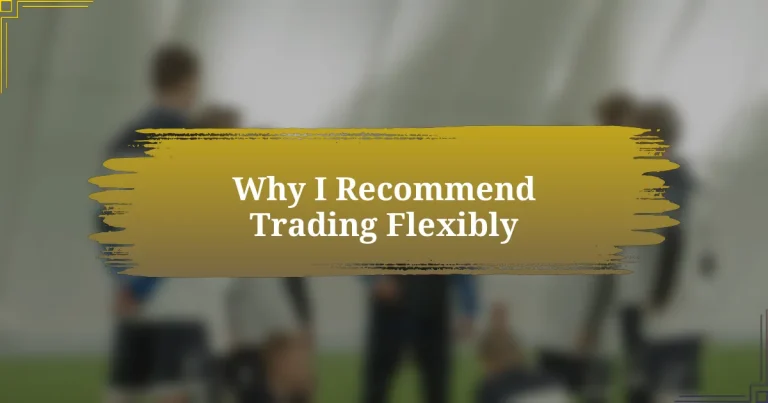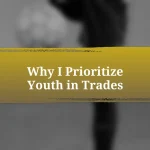Key takeaways:
- Fantasy football requires flexibility in trading strategies to maximize performance and adapt to changing player dynamics.
- Building relationships with other managers enhances trade negotiations and fosters a collaborative league environment.
- Avoid common mistakes such as overvaluing your own players and chasing headlines without thorough evaluation.
- Staying flexible allows for greater engagement with the game and can lead to unexpected successes throughout the season.
Author: Emma Hartley
Bio: Emma Hartley is an accomplished author known for her compelling narratives that explore the complexities of human relationships and societal themes. With a background in psychology and literature, her work often fuses emotional depth with sharp wit, captivating readers around the world. Emma’s novels have earned critical acclaim and numerous awards, solidifying her place in contemporary fiction. When she’s not writing, she enjoys hiking and volunteering with local literacy programs. Emma resides in Seattle with her two rescue dogs, and she is currently working on her next novel.
Understanding Fantasy Football Basics
Fantasy football is essentially a game within the game, where you get to be the coach and general manager of your own team composed of real NFL players. The excitement builds as you draft players and manage their performance week to week. Have you ever felt the rush of deciding which player to start based on their matchup? It’s exhilarating!
At its core, fantasy football revolves around week-to-week statistics, and understanding how points are scored can significantly affect your strategy. I remember the first time I realized just how crucial a single pass or reception could be; it made every game more intense as I rooted for my players. Learning to track player rankings and injuries is like getting a backstage pass to the NFL, making every Sunday an adrenaline-filled experience.
One of the most thrilling aspects for me was the weekly research involved in setting my lineup. How many times have I debated whether to play a star player who’s underperforming or a lesser-known one with a favorable matchup? Those moments not only deepened my connection to the sport but also taught me the importance of being flexible and adaptive in my trading approach.
The Importance of Flexibility
Flexibility in fantasy football can make or break your season. I recall a moment when I decided to trade a top-tier running back for a promising wide receiver during a crucial stretch. At first, it felt like a gamble, but adjusting my team’s composition in response to player performances allowed me to soar past my competition. Isn’t it fascinating how the dynamics of a team can shift with just one trade?
The landscape of player performance is ever-changing, influenced by factors like injuries or unexpected breakout games. I’ve seen countless instances where sticking to a rigid strategy led my friends to miss out on valuable trading opportunities. When I embraced flexibility, I started to notice how it enabled me to capitalize on these shifts, even snagging players that seemed undervalued during the draft. The thrill of making a timely decision based on new information is truly unbeatable.
Adapting my trading strategy also helped build stronger relationships in my league. When I opened the door to negotiations, I discovered that many other managers felt the same way. The conversations became less about stiff tactics and more about sharing insights and exploring opportunities. Can you remember a time when a trade transformed your entire season? That’s the magic of maintaining flexibility—it turns every game week into a fresh opportunity for success.
Benefits of Flexible Trading
When considering the benefits of flexible trading, I often think back to a trade I made that came out of nowhere. I remember eyeing a struggling quarterback while my backup was on fire. I wasn’t sure if I should pull the trigger, but my gut instinct told me the quarterback would find his rhythm again. Ultimately, that bold move not only bolstered my line-up but also ignited a winning streak that propelled me up the standings. Isn’t it remarkable how flexibility can transform uncertainty into opportunity?
One of the most rewarding aspects of flexible trading is the chance to tap into emerging trends. For example, midway through a season, I noticed a third-string running back getting more playtime due to injuries ahead of him. Seizing that opportunity, I traded for him and benefitted tremendously as he became the starter. This adaptability brought a surge of excitement to my season and reinforced the idea that remaining open to change can often lead to unforeseen rewards. Have you ever unlocked hidden potential simply by being willing to switch gears?
Moreover, engaging in flexible trading fosters a dynamic and vibrant league environment. I’ve had incredible conversations with other managers who shared their insights on player performance, leading to mutually beneficial trades. This back-and-forth not only enriched our game experience but also strengthened our friendships. Isn’t it fascinating how a little flexibility in your approach can turn routine transactions into engaging discussions? The camaraderie and thrill of collaboration truly enhance the fantasy football experience.
Strategies for Effective Trades
When devising an effective trading strategy, I’ve found that timing is everything. There was a moment last season when a star wide receiver got injured, and while many managers panicked, I kept a close watch on his backup. I offered a trade for him, thinking ahead to when the starter returned. As luck would have it, I reaped the benefits of a temporarily increased output, and it reminded me why having a finger on the pulse of player news is crucial. Have you considered how much market momentum can shift during key moments?
Another powerful strategy is to assess player potential beyond just statistics. I recall trading for a kicker who was on a mediocre team but had a favorable schedule coming up. I bet on his ability to capitalize on matchups, and it paid off significantly. It taught me that looking at the bigger picture and considering factors like schedule, team dynamics, and even weather can open doors to lucrative trades that others might overlook. What hidden gems have you discovered by looking deeper than the surface?
Lastly, I always recommend fostering relationships with other managers. In one league, I formed a rapport with a fellow manager who loved trading. We bounced ideas back and forth, and our willingness to negotiate led to mutually advantageous trades that significantly improved both our teams. Building trust and camaraderie can make trading a lot smoother and more rewarding. Have you tapped into the power of relationships within your league?
Common Mistakes to Avoid
When trading in fantasy football, one of the most common mistakes I see is overvaluing your own players. I once held onto a player for too long simply because I had drafted him. The reality was, his performance had dipped significantly. Letting attachment cloud judgment can cost you viable trades that could bolster your roster. Have you ever experienced a similar blind spot with your drafted players?
Another pitfall to avoid is chasing headlines without doing due diligence. I remember a season where a rookie running back caught everyone’s attention after a breakout game. Excited, I traded away a reliable starter for him, only to watch as he fell back into obscurity the following weeks. Relying solely on a player’s recent performance can lead to regretful trades. How often do you take the time to evaluate a player’s long-term potential instead?
Lastly, ignoring the league dynamics can be detrimental. In my early days of trading, I made the mistake of not considering team needs. I once offered a trade that was perfect for me but utterly useless for the other manager, who was flooded with similar players. This skewed perspective can cause your trade offers to be ignored or, worse, damage your relationships with fellow managers. Have you assessed how your trades resonate within your league’s unique landscape?
Personal Experience with Flexibility
In my fantasy football journey, I’ve learned that staying flexible with trades is essential. There was a point where I could have easily stuck to my initial plan, but I decided to pivot instead. I was eyeing a new quarterback who had just come off a great game. Shifting my strategy allowed me to seize a valuable opportunity that I may have missed had I been rigid in my thinking.
I’ve also found that adapting my trades based on weekly performance can be beneficial. Last season, I found myself in a league where injuries plagued many teams. Instead of holding tight to my initial roster, I looked for players who were stepping up as starters due to these unfortunate events. It was eye-opening to realize how flexibility not only improved my team, but also kept me more engaged throughout the season. Have you considered how often you adjust your strategy based on current circumstances?
I can recall a time when I faced tough competition in my league. I hesitated to trade a notoriously streaky player who had a brief run of decent performances. Finally, I decided to be flexible, letting him go for a more consistent contributor. The decision paid off, teaching me that a willingness to adapt can make all the difference in navigating a competitive fantasy landscape. Isn’t it liberating to realize that flexibility can be your greatest asset?
Conclusion and Final Thoughts
Trading flexibly in fantasy football isn’t just a strategy; it’s a mindset that transformed my approach to the game. I recall one season when I clung to a player I’d drafted highly, despite his underwhelming performance. Once I let go and made a trade for someone more consistent, my whole season flipped. Isn’t it fascinating how a change in perspective can lead to unexpected triumphs?
It’s clear to me that embracing flexibility serves not just our success, but also our enjoyment of the game. I vividly remember the thrill of discovering hidden gems on the waiver wire after some key injuries. I felt invigorated each week, strategizing anew as the landscape shifted. Have you felt that rush when you make a bold move and it pays off?
Ultimately, my experience has shown me that rigid plans often stifle potential. Being flexible allows us to seize the moment and embrace the unpredictability of fantasy football. It’s an empowering realization: the more adaptable we are, the more we can enjoy the journey and triumph in this ever-changing competition. Wouldn’t you agree that the thrill lies in the unexpected victories?















